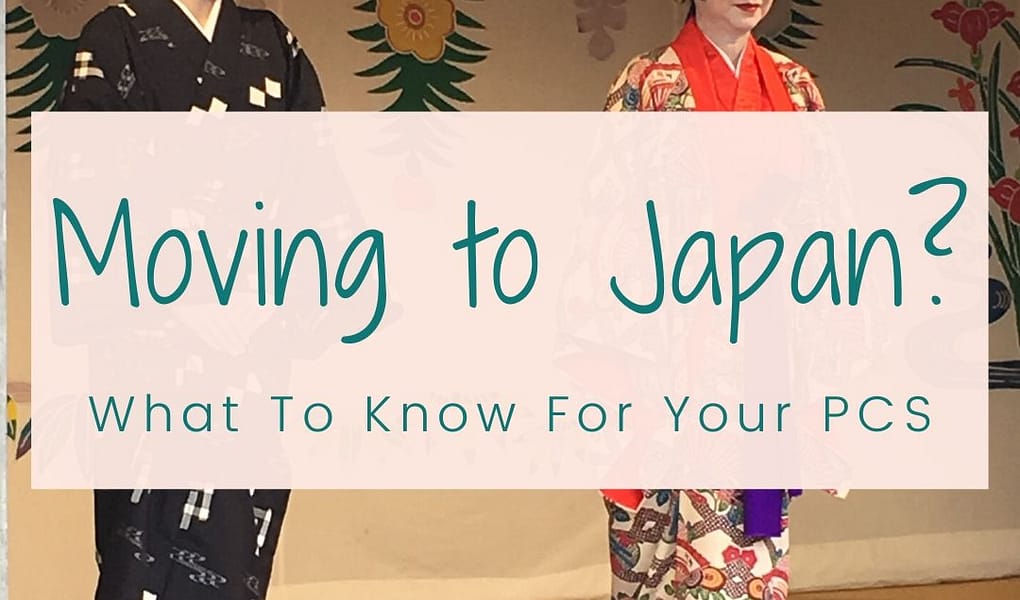All great changes are preceded by chaos – Deepak Chopra
In spring 2018, I embarked on the biggest, and longest, adventure of my life. Husband and I relocated to Japan with the military. Moving is one of the most exciting, and most heartbreaking and stressful parts of military life.
As a new military spouse going through my first PCS, I learned quite a bit. Each family, each branch, and each station will have a different moving experience. Hopefully, this list will help you feel better prepared (and excited!) about your move to Japan!
Planes, trains, and automobiles – getting to your new home
Despite having spent more than 12 hours in the air, and many more hours in airports, arriving in Tokyo wasn’t the end of our journey to our new home in Japan. We still had to make it to the base, which is more than 3 hours from the airport.
Talk with your sponsor before arrival about the best way to get to your post. Japan’s public transportation is safe and reliable, but some bases will offer charter bus services to and from the airport a few times a day. Drivers of on-base buses may accept either cash or yen. If you need to take Japanese transportation, you will need to pay with yen or credit card. Bus tickets can often be purchased at a counter or kiosk, and occasionally at the pick-up point.
English is pretty prevalent
Knowing that much of the Japanese language uses non-Roman characters caused some anxiety before our move. Once we arrived, I was surprised by the prevalence of English, even in our area away from the big city. While many restaurants and stores don’t have English, transportation is very accessible. Many staff will speak enough to help direct you, and in a pinch, Google translate can usually help you get your point across.
Public transportation makes moving around the country a breeze
To get around Japan, I often use a combination of walking and the train. Narrow Japanese streets mean I rarely drive, unless I’m shopping for big items or groceries. Trains run regularly and can take you most places on Honshu (and even nearby islands like Kyushu). Like many cities, you’ll do well to purchase a Passmo or IC card once you arrive in Japan. These give you a slight discount on tickets and make it easy to pay for train fare. A few smaller cities and remote areas may still require you to purchase a physical ticket, but the staff can help you if you have trouble.

Don’t be afraid to pack your furniture
Many bases offer loaner furniture once your family is placed in housing, but before your household goods arrive. Spending two months on a stiff blue couch made me so grateful when our things arrived. Before our move, I was recommended to store or sell much of our furniture in the States, and I’m so glad we didn’t follow that advice.
The loaner furniture for our base isn’t very comfortable or visually appealing, and buying new items in Japan would’ve been expensive. All of our furniture and household items fit our weight allowance, so we brought it with us. While it can somewhat limit the large furnishings we can buy in Japan, I’m much happier with our comfy brown couch. It’s also easier to leave our big items from the States with another family just arriving, should our weight allowance be too close when we PCS.
(As a note, many bases discourage bringing king-sized beds or larger. While many houses on our base can accommodate that size, other installations and off-post housing may not. Check with your transportation office for recommendations).
Looking for more resources on what to pack, during pack out? Check out Military One Source and move.mil.
Plan to ditch your car or store it stateside
Moving a car overseas is an expensive endeavor. If you decide to ship your car, expect to receive work on it in Japan to ensure it’s up to the country’s specifications.
Rather than store or ship, Husband and I both sold our more than 15-year-old cars before we moved. We knew there were English speaking dealers near the base, and we set aside money in advance for the purchase. For less than $5,000, we bought and insured our car for the three years we lived in the country.
Move.mil has some information on how to ship or store your vehicle.
Pack a little something for all kinds of weather
Japan has pretty standard weather, but our arrival in April left me feeling chillier than I expected. Without much “cool weather” gear, I was left to make do with what I had, and ended up buying a rain jacket – a great purchase as we got around on foot before buying a car.
Typhoon (aka hurricane) season is July-October, so if you’re moving in this time frame, be aware that delays can happen. The yearly rainy season usually occurs in May or June, although the fall can see some rain as well. Summers are often hot and humid, and every year I’m surprised at how much I can sweat. I recommend packing a good water bottle, as well as some basic rain gear in your carry on luggage.

Have a conversation with your phone company
Your move to Japan doesn’t necessarily mean you need a new cell phone number. Many service members and families find it helpful to have a Japanese phone number, but it’s often not necessary. Some US phone companies offer an international or Japan add-on plan, while apps and iMessage make it possible to communicate via WiFi for free regardless of your phone number.
Make sure you’re insured before moving
As soon as you have your orders, it’s a good idea to touch base with your insurance company. Many US-based companies can offer renter’s insurance overseas but are unable to open a new policy once you’ve left the States. Although our car insurance is through a Japanese company, we do have a US Touring Policy through USAA. This policy not only covers us as drivers during visits to the States but also ensures we keep our longstanding relationship (and discounts) with USAA. If your current company can’t keep you on as a customer, they may have an affiliate or sister company they can recommend in Japan.
You could have an extended stay in temporary housing
The availability of housing often varies, but some people stay as long as a month in on-post lodging. It’s not the most fun, but it is do-able, especially if you’re able to get out and learn the train system early. Don’t spend all day in the room, and the time will fly by.

Connect early
One of the worst parts of moving is leaving behind a community of friends, resources, and businesses you’ve come to know and rely on. Don’t wait until you arrive to connect with your new duty station! As soon as I found out about our move to Japan, I wanted to connect with other people who had made the move. Getting answers to some of my questions from families who had done it gave me the confidence I could do it too! Look for spouses or community groups, or buy/sell/trade groups on Facebook related to your new installation.
This Reddit thread is also good for some general Japan, traveling questions, but the answers are not military/SOFA status specific.
In-process your new home with your service member
For the first time, I was able to in-process with my Husband when we arrived. We didn’t have children or pets, and his sponsor was kind enough to cart me along as well. In-processing not only helped me located essential buildings, but it also helped regulate my sleep schedule. Servicemembers at our post are required to take a week-long orientation and language class, and I also tagged along. This information was invaluable and helped me feel like part of both the military and local communities.
Go easy on yourself
Easy things in the States can sometimes feel harder and overwhelming when moving to a new country – prepare yourself, but don’t let these feelings bog you down.
It takes a surprising amount of mental and emotional energy to do even simple things in a country where you don’t speak the language. This is true for us even now, after two-and-a-half years in Japan. It’s perfectly natural to feel overwhelmed by basic tasks, especially when you first arrive. But don’t get stuck in that feeling. Keep powering through, and get out, see the country, and try new things. While on some level it gets more comfortable, you’ll always be a foreigner.
Moving is a stressful but exciting time. An overseas move will offer you and your family an opportunity to invest in another country and community, and you’re guaranteed to learn more about yourself and the world. Keep an open mind and plan to get out and make the most of your new home!
Looking for even more? Check out this post I wrote for Right + Up – 12 Things to Know When Your Orders Say Japan

Military life offers some great opportunities, including the chance to live all over the world. But moving is hard. I’ve created a free resource, all about unaccompanied baggage. Being informed about the moving process will make everything smoother. Click the banner to claim your free eBook!



